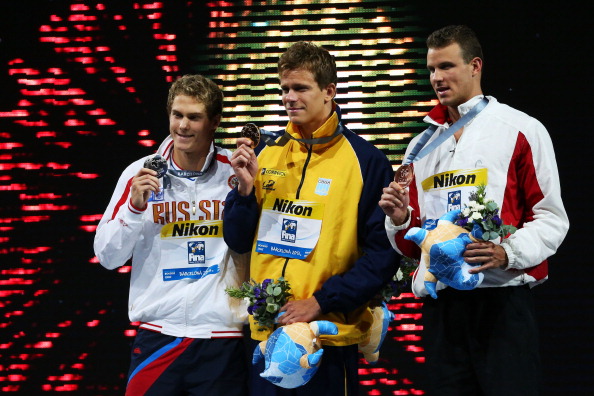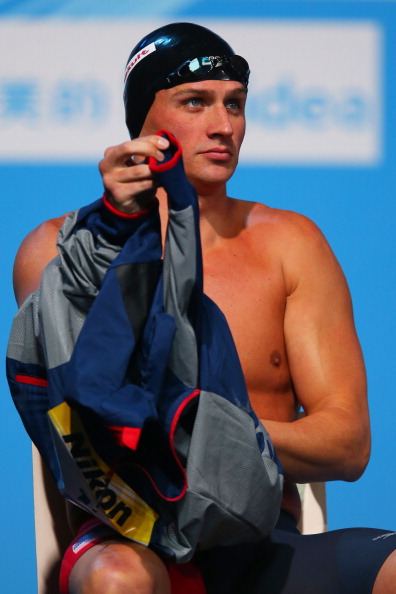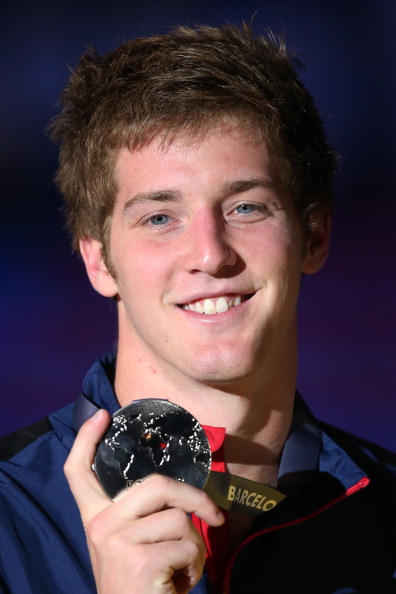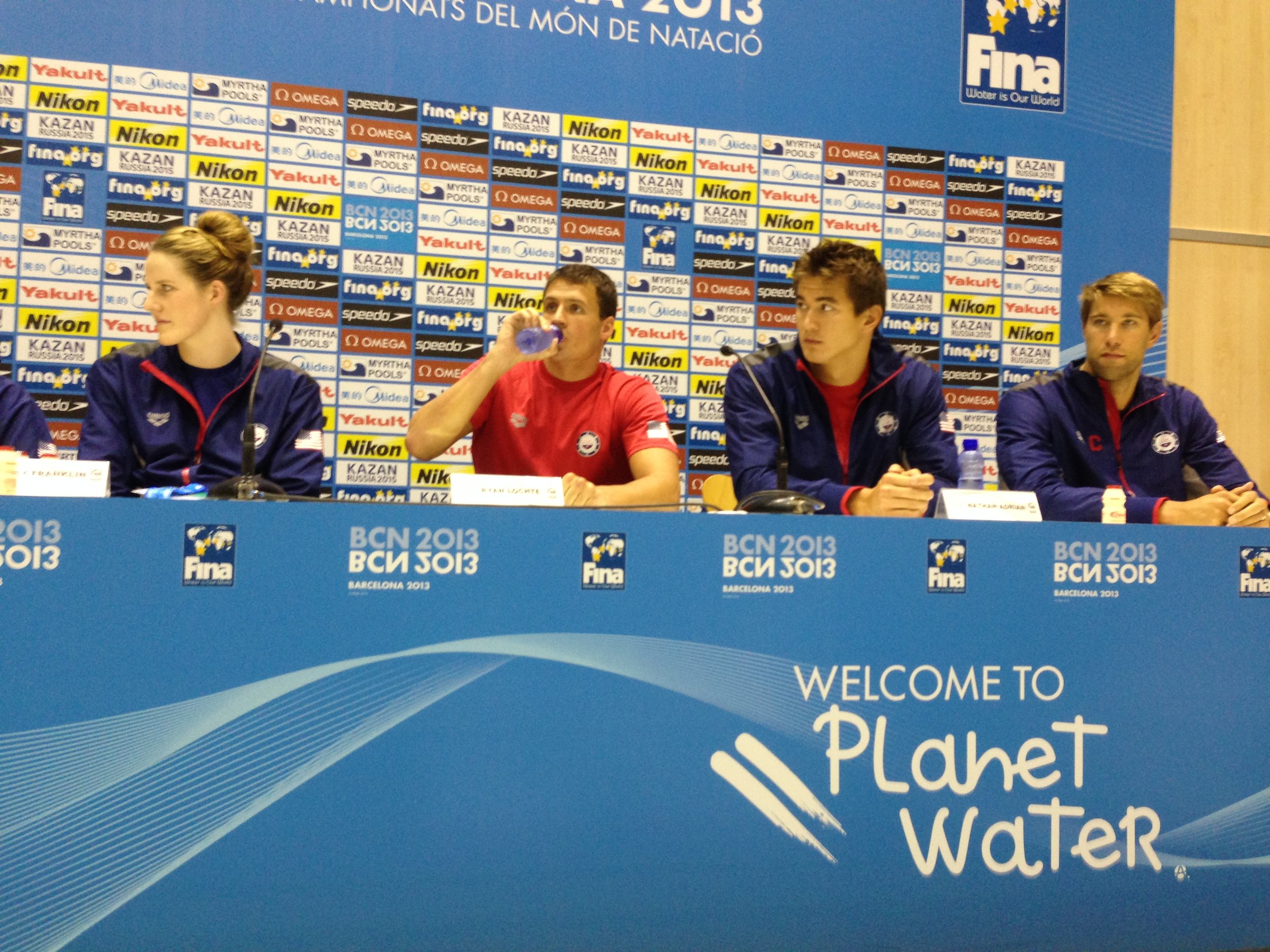BARCELONA -- If the men's 100 freestyle is the equivalent of a heavyweight fight, the 50 free is completely damn simple to understand. One lap. Raw power and speed. First one to the other side is the man. Thirteen years ago, two Americans, Anthony Ervin and Gary Hall Jr., tied for the gold medal at the Sydney Olympics in the 50 free, in a time of 21.8 seconds.
In what may have been the most loaded 50 free field ever, Brazil's Cesar's Cielo rocked it Saturday night at the Palau Sant Jordi in 21.32 seconds. Afterward, he cried -- and cried -- on the medals stand, the tears redemption after knee surgery and validation of his standing as one of the all-time sprint greats. The crowd roared.
The time, the field, the race, all of it underscored how swimming keeps getting better and better. Indeed, this 50 free produced a new star, Russia's Vlad Morozov, who won silver, in 21.47, even as it re-charged the career of one of the sport's leading lights, George Bovell of Trinidad & Tobago, who won bronze in 21.51, the island nation's first-ever world-championships medal.
The 50 free highlighted a day and night of extraordinary racing.
American Katie Ledecky, for instance, set another world-record, her second here, in winning the women's 800, in 8:13.86. She is so good that runner-up Lotte Friis of Denmark applauded as Ledecky got out of the pool.
Ledecky's 800 marked her fourth gold here in Barcelona. She also won the 400, 1500 and took part in the 4x200 relay. She took six seconds off the world-record in the 1500. Her 400 time was an American record.
When she gets home, she hopes to get her driver's license.
"I am thrilled," she said. "I exceeded my expectations for this year."
Her roommate at these worlds, Simone Manuel, who turned 17 on Friday, grabbed the final spot in the women's 50 free final Sunday by swimming 24.91; she is the first 18-and-under swimmer in U.S. history to break 25 seconds.
Missy Franklin won her fifth gold medal Saturday, in the 200 backstroke, her signature event, in 2:04.76. She is the first woman since Australia's Libby Trickett to win five gold medals at a world championships, and swims Sunday in the medley relay for a sixth.
No female swimmer has ever won six gold medals at a world championships. Franklin could join Michael Phelps, Mark Spitz and Kristin Otto of East Germany as the only swimmers to win as many as six golds at the worlds or the Olympics. Otto won six golds at the 1988 Seoul Games.
Asked about six, Franklin said it would "mean so much to me" but cautioned about the medley, "Like every single race here, we are going to have very tough competition."
In the morning heats, Russia's Yulia Efimova set a world record in the women's 50 breaststroke, 29.78. The record lasted until the evening -- when Lithuania's Ruta Meilutyte went 29.48 in the semifinals.
The world records in the women's 50, 100 and 200 have all fallen at these 2013 championships -- stunning, because the plastic suits from 2008-09 were said to have helped the breaststroke most of all. The women's 50 breaststroke final is set for Sunday evening.
Ryan Lochte, the day after winning two medals and setting a personal best in the 100 fly semifinals, finished sixth in the men's 100 fly. South Africa's Chad le Clos, closing in the second lap just the way Phelps used to, won in 51.06.
"I don't know if it had an effect, the triple last night, but I just didn't have it," Lochte said.
Cielo for sure had it.
He won his third straight world championships title in the 50 free -- this despite surgery on both knees after the Olympics, and not even racing the 100 free.
The eight lanes of this 50 free final held three Olympic champions: Ervin, from 2000; Cielo, 2008; France's Florent Manaudou, 2012.
All eight guys had an Olympic medal. In all, there were 14 medals among the group -- seven gold, four silver, four bronze. Five of the eight had an individual medal.
To illustrate how the race has developed -- owing to advances in strength-training, straight-arm freestyle technique, a change in the racing blocks themselves and other factors -- Ervin finished Saturday in 21.65.
He took sixth.
"It happens," he said, adding, "I just felt incredible yesterday. Things were a little bit apart from that when I was going through my routine today. So, you know, I don't attribute it to much other than things didn't line up perfectly. I didn't get the strike. I got the spare. Whatever."
Nathan Adrian, the London 100 gold medalist, finished fourth, in 21.6.
He said, "21.6 would medal at most international competitions but the 50 was really fast this year," adding, "I have been saying this all week: training has become so specific for every single event. Vlad and I were the only ones who swam the 100 and the 50. Look at the results from 2000, and that's not going to be the same. It has become so specific. The more you specialize, the better you can become at any particular event."
In the semis, Manaudou had gone 21.37. He looked like the man to beat.
Instead, the race was all about Lanes 6, 7 and 8 -- Cielo, Morozov and Bovell.
Cielo had gone 21.76 in the prelims, then 21.6 in the semis.
But, as Cielo said late Saturday, there's a big difference between swimming the 50 and sprinting the 50. He reminded himself to swim "fast and long, fast and long," and that's what he did, keeping his head down. his stroke long: "When I saw the scoreboard, I was ecstatic. I had no idea where I was."
Morozov, 21, moved to Southern California from Siberia when he was 14. He ripped up the NCAA championships this year swimming for USC, taking down no less than Cielo's record in the 100-yard sprint, then turned pro. He turned in a 47.62 in the 100 at the Summer University Games a few weeks back.
Here, in the 100, he went out in the first 50 in 21.94 -- the first sub-22 split, ever, in any major international final. He finished fifth, in 48.01. "I wish I didn't go out as fast," he said ruefully.
In the 50 prelims, he went 21.95. The semis, 21.63.
In this race, there was no back half to worry about. Just 50 meters.
Morozov's 21.47 is a new national record -- beating the mark he set in the semis. He set it in front of Alex Popov, the former Russian sprint star -- who gave out the medals Saturday night.
"I'm really stoked with these medals," Morozov said, proving that seven years in SoCal is plenty long enough to learn to talk like a native. He also won a bronze medal as part of the 4x100 relay.
Morozov, noting that this was his first long-course championships at which he was swimming individual events, added a moment later, "To come here and get a silver medal already with guys who were in my heat -- they were already Olympic champions, world champions … I am really stoked with that. In 2016 I will do my best so that no one will be close to me."
Sprinters, it must be noted, do not as a general rule lack for confidence.
"He's going to give us a lot of trouble in the next years," Cielo said of Morozov, smiling.
Bovell, meanwhile, won a bronze medal in the 200 IM -- behind Phelps and Lochte -- in Athens in 2004. After that, he hurt his knee and could no longer swim the breaststroke.
He re-made himself into a sprinter. He turned 30 two weeks ago and, as he said, "To be honest, when you get to be my age, there is some pressure to grow up, so to speak." A trip to these worlds without a medal, he said, would have put pressure on him to stop swimming competitively.
Now, he said, he intends to keep on through Rio. "I love swimming," he said. "I did not want to give it up."
















